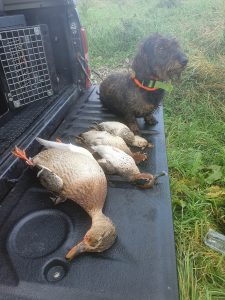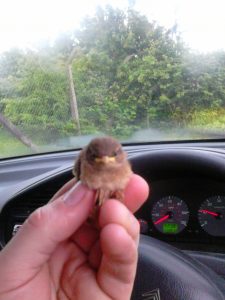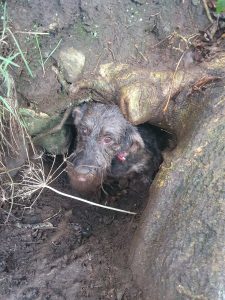Irish Extra – January 2023

The Peak of the Season
As we arrive into January and leave Christmas behind, the season is really in its peak before it reaches an end – The long spring and summer of bird rearing, dog training and the many, many other aspects of country sports that go on all year round and contribute massively to the economy continue. As my friend once said, days actually spent shooting, hunting or whatever you do are small in comparison to the days you spend working on or towards it, country sports isn’t simply something that we put on the shelf for a day it might suit, it is an entire way of life.
As is my tradition I spent Boxing Day with just the dogs and my newly acquired shotgun – I must say, the 20bore has breathed new life into shooting for me. Not only am I shooting much better but it is a pleasure to carry the gun over a whole day and I am really enjoying it. Our location boxing day was our usual one for the day but it was rather more enjoyable this year as we had not been since before the pandemic as the entire place had been closed even for our solitary outdoor activities!
Boxing Day would be a term used on my home turf while St Stephens day would be wider used further South in Ireland while Wren Day or sometimes Wren Hunting Day or even “Ran Day” or in Irish Lá an Dreoilín is a term used for the old traditional pageantry of Wren day. It is really a theatrical tradition nowadays which has its origins back to the hunting and capture of a Wren. Nowadays a mock Wren is placed on a pole and paraded through towns and villages by participants called mummers or strawboys who dress up in straw masks, headwear and colourful clothing. In days gone by the Wren was actually hunted and the captured Wren was tied to the leaders staff and paraded just as the mock Wren is today. It was traditional for Wren boys to collect money during their parade and give patrons a feather from the bird for good luck, the money being used to run a Wren Ball which when collected nowadays is given to charity. The tradition is carried out in some parts of the UK including Wales and the Isle of Man but is believed to originated from the Celts.I have always loved Wrens and many years ago one flew in my car window and landed on the dash as I was parked up along a quiet road with the intention of letting the lurchers out for a break during what had been a long drive, completely unconcerned, he sat that there and looked me up and down before stepping onto my hand and letting me inspect him. I have also recently noticed that they seem to be active a lot later than other birds and are still busy through the hedgerows when the light is almost gone and the other birds are long asleep!


We had a cold snap just prior to and around Christmas and it was a great opportunity for me to take a wonder out with a couple of Teckels. “Cider” who unbelievably is now in her 5th year and “Remy” now in his third are a great little team and I set off late one morning not expecting much excitement at all. Within a few hundred yards of my house there are a few earths which we check now and again and with the frost I was hoping someone might be at home. I didn’t have to wait long as when we entered one field, “Remy” had his nose down along a fence line and began to run with “Cider” not far behind. By the time I reached them, “Cider” had slipped into a little earth under a tree and “Remy” was outside it whining being impatient. I slipped a lead on him and moved him back a little and could hear faint baying below. I stood back on the bank, reached into my pocket for two cartridges and a ginger ball exploded from under the tree – By the time I got myself together he was long gone and “Remy” almost took the fence with him up the field! He saw the fox bolting was doing cartwheels on the end of the lead, I had no choice but to let him off as “Cider” arrived at the mouth of the earth looking rather unimpressed with my lack of organisation. After 15 minutes or so “Remy” had not returned and a quick look on his tracking device showed him near a laneway on the far side of the river so it was a quick walk to retrieve him. We checked a few more earths along the river and had a bit of a rake about before the light started to fade and we made for home.

The Christmas and New Year period is for many a time for reflection, looking back and looking ahead. For me it is the same and this year I gave a lot of thought to the many organisations that protect, promote and defend country sports all year round and I feel especially for us here in Northern and Southern Ireland we should be grateful to our organisations. Recent times have been challenging for field sports and it was back around Christmas 2021 we saw the defeat of John Blairs Bill, which was quite simply a career move for him and nothing to do with animal welfare. During this time The Countryside Alliance, The Irish Working Terrier Federation, The Hunting Association and many other groups, organisations and individuals worked and supported country sports and pushed back hard against a bill which was ultimately defeated because it was nothing more than an attack on the countryside. It is these organisations with many people working on a voluntary basis that are the life blood of our sport. One man who really gives his all for country sports is the secretary of the Irish Working Terrier federation – A gentleman who wants nothing but the continuation of not only terrier work but all country sports and works incredibly hard for it. He thinks nothing of driving a 10 or 12 hour round trip to spend 20 minutes at a meeting, or of working late into the night on something that needs completed, while making phone calls, sending emails and doing just whatever needs done – All because he has a passion for country sports and whats to see it continue, he is a stalwart and the type of person we need more of.

From the NARGC
The European Parliament has today voted on the motion “A long-term vision for the EU’s rural areas”. Europe’s rural areas are home to 137 million people representing almost 30% of its population and over 80% of its territory. The motion includes important recognition of game management and its social, economic, cultural and biodiversity benefits as well as a key request to reduce conflicts with large carnivores.
To ensure that rural areas can continue to play these essential roles, a European Commission communication sets out a long-term vision for the EU’s rural areas up to 2040. It identifies areas of action towards stronger, connected, resilient and prosperous rural areas and communities. A Rural Pact and an EU Rural Action Plan with tangible flagship projects and new tools will help achieve the goals of this vision.
The European Parliament’s motion voted today captures the complex economic and social challenges Europe’s rural areas are facing. It presents a number of important solutions to ensure that rural communities are brought along the green transition.
While rural areas in Europe are profoundly diverse from an historical, geographical, and economic perspective, they often face similar social and economic challenges. For instance, access to high-quality services of general interest, demographic decline and ageing, vulnerability to the impacts of crisis, and political underrepresentation are just some of the challenges affecting rural communities.
Until Next Time….Happy New Year